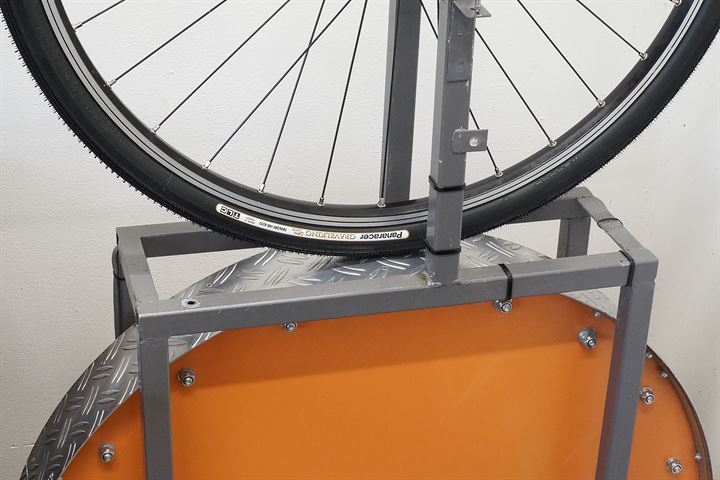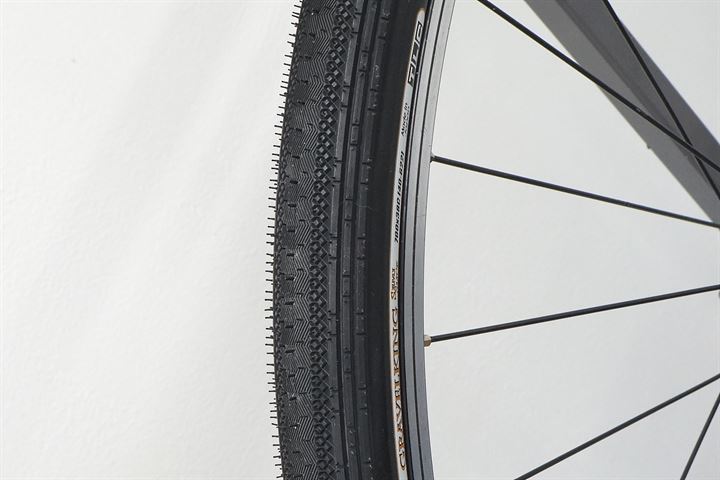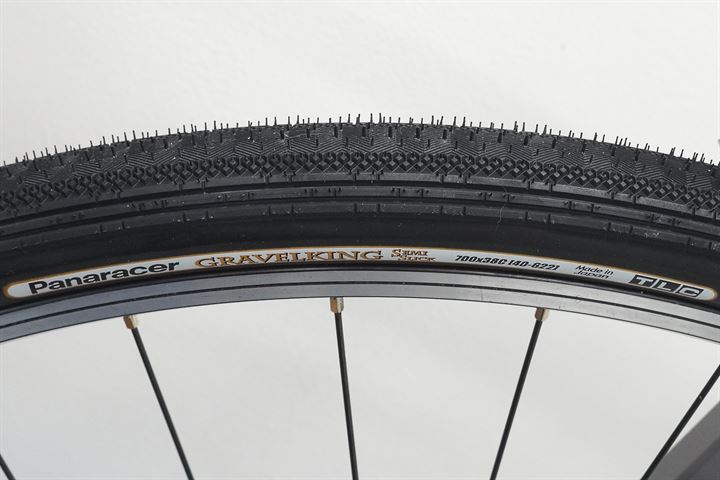CX/Gravel Tire Test: Panaracer GravelKing SS TLC 40
Contents and Test Summary
- Introduction
- Manufacturer Specifications
- Size, Weight, Thickness
- Rolling Resistance: 19.2 Watts
- Puncture Resistance: 45 Points
- Static Wet Grip: 64 Points
- Conclusion: 4.3 / 5 Highly Recommended
- Comments
- Panaracer GravelKing SS TLC 40
(100% is best)

The Panaracer GravelKing SS (Semi-Slick) TLC is a gravel bike tire positioned right in between the nearly-slick GravelKing and the GravelKing SK that's made for rougher conditions. The GravelKing SS features a tread pattern that we see more often on gravel bike tires: a nearly-slick center tread and bigger knobs (GravelKing SK-like) toward the edge of the tire.
Ad Buy Panaracer GravelKing SS TLC at Amazon.com
From a construction standpoint, the TLC (Tubeless-Compatible) versions of the GravelKing (read our review), GravelKing SK (read our review), and GravelKing SS are identical as they all use the same casing and compound. The TLC casing is made from Panaracer's "AX-Alpha Cord" that, together with an extra layer of puncture-resistant material that runs from bead to bead, makes this an "Anti-Flat Casing". The compound is Panaracer's ZSG (Zero Slip Grip) compound that's used on many other Panaracer tires.
Just like many other Panaracer tires, the GravelKing SS is available in a large range of sizes that range from 32-622 up to the 43-622 and 48-584 sizes. We've tested the TLC version as it appears to be the most popular because of its versatility. The TLC version gives you the choice to use it with an inner tube or in a tubeless set up with sealant.
Manufacturer Specifications
| Manufacturer Specs | |
|---|---|
| Brand | Panaracer |
| Model | GravelKing SS TLC |
| Year | 2021 |
| Supplied By | Bought in store |
| New or Used | New |
| Mileage | 0 km |
| Price Range | High |
| Buy At | Ad Amazon.com |
| Manufacturer part number | RF738-GK-SMS-B |
| TPI | - |
| Compound | ZSG |
| Bead | Folding |
| ETRTO | 40-622 |
| Specified Weight | 410 grams |
| Max Air Pressure (psi) | 75 |
| Made In | Members Only |
| Available Sizes |
32-622 (700x32c) 35-622 (700x35c) 40-622 (700x38c) 43-622 (700x43c) 48-584 (650x48b) |
Panaracer GravelKing SS TLC 40 Test Results

Size, Weight, and Thickness Measurements
| Size, Weight, and Thickness Measurements | |
|---|---|
| Specified Weight | 410 grams |
| Measured Weight | 405 grams |
| Measured Width Casing | 36 mm (un-round) |
| Measured Width Tread | 36 mm |
| Measured Height | 33 mm (un-round) |
| Measured Knob Height Center | 0.2 mm |
| Measured Knob Height Edge | 1.7 mm |
| Measured Total Thickness Center (excluding knobs) | 2.80 mm |
| Measured Total Thickness Sidewall | Members Only |
| All size measurements are taken at low air pressure on a 17.8 mm inner width rim. | |
Rolling Resistance Test Results
| Rolling Resistance Test Results | ||
|---|---|---|
| Inner Tube |
None (30 ml sealant) (current protocol) | Conti Cross28 (160 gr) (test protocol) |
| Measured Width | 36 mm | 36 mm |
| Rolling Resistance Real tire width in mm: 30-32 = 66 psi/4.6 bar 33-35 = 60 psi/4.1 bar 36-38 = 54 psi/3.7 bar 39-42 = 50 psi/3.4 bar 43-46 = 46 psi/3.2 bar 47-50 = 42 psi/2.9 barHigh Air Pressure (54 psi / 3.7 bar) |
Members Only | Members Only |
| Rolling Resistance Real tire width in mm: 30-32 = 55 psi/3.8 bar 33-35 = 50 psi/3.4 bar 36-38 = 45 psi/3.1 bar 39-42 = 42 psi/2.9 bar 43-46 = 38 psi/2.6 bar 47-50 = 35 psi/2.4 barMedium Air Pressure (45 psi / 3.1 bar) |
Members Only | Members Only |
| Rolling Resistance Real tire width in mm: 30-32 = 44 psi/3.0 bar 33-35 = 40 psi/2.8 bar 36-38 = 36 psi/2.6 bar 39-42 = 33 psi/2.3 bar 43-46 = 31 psi/2.1 bar 47-50 = 28 psi/1.9 barLow Air Pressure (36 psi / 2.6 bar) |
19.2 Watts CRR: 0.00576 | 23.0 Watts CRR: 0.00689 |
| Rolling Resistance Real tire width in mm: 30-32 = 33 psi/2.3 bar 33-35 = 30 psi/2.1 bar 36-38 = 27 psi/1.9 bar 39-42 = 25 psi/1.7 bar 43-46 = 23 psi/1.6 bar 47-50 = 21 psi/1.4 barExtra Low Air Pressure (27 psi / 1.9 bar) |
22.5 Watts CRR: 0.00674 | 27.5 Watts CRR: 0.00824 |
| The CX/Gravel section is a multi tire size section, air pressures have been adjusted to the measured casing width. All numbers are for a single tire at a speed of 29 km/h / 18 mph and a load of 42.5 kg / 94 lbs. Use the formula: RR (Watts) = CRR * speed (m/s) * load (N) to calculate rolling resistance at a given speed and load. |
||
Puncture Resistance Test Results

| Puncture Resistance Test Results (higher is better) | |
|---|---|
| Total Puncture Score Tread | 45 Points |
| Total Puncture Score Sidewall | Members Only |
| Tread Puncture Force Sharp Needle | Members Only |
| Tread Puncture Force Blunt Needle | Members Only |
| Tread Total Tire Thickness | 2.80 mm |
| Sidewall Puncture Force Sharp Needle | Members Only |
| Sidewall Puncture Force Blunt Needle | Members Only |
| Sidewall Total Tire Thickness | Members Only |
Hard Surface Static Grip Test Results
| Static Grip Test Results | |
|---|---|
| Wet Grip Average | 64 Points |
| Wet Grip Center | Members Only |
| Wet Grip Edge | Members Only |
| Measured Knob Height Center | 0.2 mm |
| Measured Knob Height Edge | 1.7 mm |
| Grip in points = coefficient of friction * 100 CX/Gravel grip test rim width = 23.0 mm |
|
| Wet Grip Test and Off-Road Tires (info) | |
Conclusion
- Panaracer GravelKing SS TLC 40
(100% is fastest - lightest - highest - strongest)
The Panaracer GravelKing SS performs excellent in our tests. In the rolling resistance tests, it shows good performance and comes in right between the very fast GravelKing and still quite fast GravelKing SK. The real strength of the GravelKing SS can be found in the puncture resistance tests of the tread as it scores much better here mainly because of the increased thickness of the tread.
If you've suffered cuts, punctures, or lack of durability with the regular GravelKing, we highly recommend you to try the GravelKing SS as it's a more solid gravel bike tire that also should last a bit longer. The increased strength and durability comes at the cost of a few watts of rolling resistance and an extra ~70 grams per tire increase in rotational weight.
If you like to compare the Panaracer GravelKing, GravelKing SS, and GravelKing side by side, try our comparison section: Panaracer GravelKing vs GravelKing SS vs GravelKing SK.
Ad Buy Panaracer GravelKing SS TLC at Amazon.com
RATING:
4.3
/ 5
TEST VERDICT:
Highly Recommended
